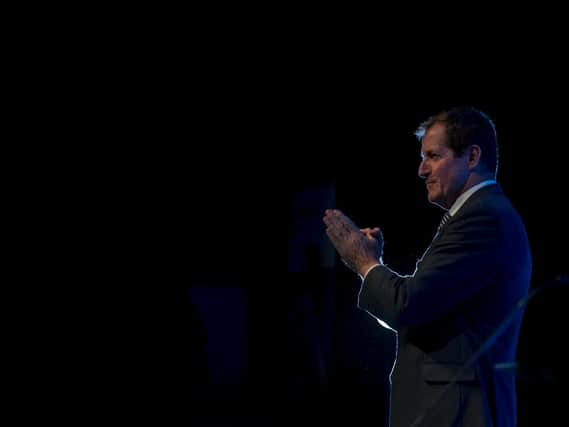Alastair Campbell returns to Keighley to talk depression, racism in fooball and singing Nessun Dorma


“Elvis Presley’s in my jam jar, Motown’s in my jam jar, Édith Piaf’s in my jam jar,” Alastair Campbell declares to a small crowd in his Yorkshire hometown.
It’s the first time the ex-Downing Street communications director has been inside the room at the Steeton Hall Hotel since an awards ceremony for the Keighley supporters branch of his beloved Burnley FC.
Advertisement
Hide AdAdvertisement
Hide AdBut the subject on this occasion, like much of his work since his departure from the heart of Labour’s Government in the mid-2000s, is mental health.


Local businessman James Bailey, the son of Campbell’s best friend at Utley Primary School, John, co-organised a talk about his experiences of depression and how to improve workplace wellbeing with Airedale Enterprise. This is where the jam jar comes in – but more on that later.
An interview with The Yorkshire Post before his talk came about due to his disdain for the Government’s response to racism directed at England’s black footballers after the team’s penalties loss to Italy in the Euro 2020 final.
Prime Minister Boris Johnson and Home Secretary Priti Patel have been accused of stoking an atmosphere that led to the abuse after they did not condemn those who booed players taking the knee. Johnson has since suggested that online racists could be banned from football stadiums but Campbell, surrounded by a backdrop of St George flag bunting still up in the hall’s garden after the tournament, naturally doesn’t hold back.
Advertisement
Hide AdAdvertisement
Hide Ad“What I think about it is that they’re desperately, having got themselves massively on the wrong side of an argument, they’re desperately trying to back-pedal, but I don’t believe it for a minute,” he says. “The Tory MP for Dover who said ‘Perhaps if Rashford concentrated more on football and less on politics...’ that is what they think.
Campbell says Johnson, “in word and deed, has deliberately provoked division, racism, (and) the use of racist tropes.”
He adds: “It’s incredible when you think this, but if you go through the standards of public life that we’re meant to expect, which are the Nolan Principles of honesty, openness, objectivity, selflessness, integrity, accountability and leadership, (it’s) England footballers and Gareth Southgate seven, Johnson and the Cabinet nil.
“I think it’s great that people are looking at people like Rashford and Sterling and thinking at last we can see footballers who are genuinely role models etcetera, fantastic. But it’s happening, I think, because we’re seeing the exact opposite in our politics and our public life.”
Advertisement
Hide AdAdvertisement
Hide AdCampbell had been criticising the PM on Twitter, a platform which is potentially fraught with mental health pitfalls. The former journalist says he’s not actually on social media as much as people might think, and when he is, doesn’t engage with trolls. “I don’t want to sound arrogant, but if you do a tweet and you get, say, 500, 600 responses... I just honestly wouldn’t have the time to read them and respond to them,” he says.
“I mean the other thing is, because I had a profile and a lot of, you know, negative profile before social media, I do have a genuinely very thick skin. People who I don’t know, I honestly don’t care what they think about me.”
And he has released a number of personally revealing books, including last year’s Living Better: How I Learned to Survive Depression.
Campbell, 64, was born in Keighley, where he stayed until 11 (Cliffe Castle Museum features his portrait in the “history” section, he says with a mock eye-roll). The family moved to Leicester after his father Donald, a Scottish vet, had a “horrific accident” with a sow.
Advertisement
Hide AdAdvertisement
Hide AdIn 1986, Campbell had a breakdown while working as a political journalist. Though always open about it, he took nearly another 20 years to really address his depression in 2005, after his role in Tony Blair’s third election win for Labour. Things came to a head when he began punching himself in the face while out walking his partner Fiona Millar on Hampstead Heath.
In his 2019 BBC documentary, Alastair Campbell: Depression and Me, he met counsellor Dr Jehannine Austin, who introduced the jar metaphor: we all have our own jars filled with genetic and environmental elements which can make us vulnerable to mental ill health as it fills up. But, the idea is that our jars can grow taller to accommodate protections to help us cope.
For Campbell, those include Fiona, family and friends; essentials such as good diet, exercise and sleep; meaningful activity like work and campaigning; and personal interests (Burnley FC and The King). Simple enough, but it’s one strategy for depression –he also takes medication – that Campbell describes as “life-saving”.
During his time in Government, was he supported in dealing with mental health problems? Conversely, does he think that he respected the wellbeing of others? It’s well-documented that Campbell was said to have been an early inspiration behind the scathing spin doctor Malcolm Tucker in TV political comedy The Thick of It.
Advertisement
Hide AdAdvertisement
Hide Ad“In relation to myself, I always felt it helped that I was being open. I wasn’t going around the place saying, you know, ‘I feel terrible’. But I would tell my secretary, I would tell my number two, my deputy. If I thought it was relevant to something I was doing I might tell Tony Blair. Just say ‘I’m going through a rough patch’. And in general, that was fine. What it usually meant was that I’d be operating at a 65, 70 per cent level of my usual energy and productivity, it meant that I would probably need to rest a bit.”
In relation to those who worked for him, he believes he was a good employer and told workers things like: “Just because I’m in at six o’clock it doesn’t mean you have to be.”
Campbell adds: “I looked out for them, I watched their back, if I felt they were struggling with anything at all I’d kind of be there for them. Did I go over the top sometimes with journalists? Maybe. But the only thing I’d say about that is that it is a very rough environment. And what I find with the media, particularly the Westminster media, is that they absolutely love giving it out, but the minute you stand up to them they get very, very...” he trails off.
“I think only twice did I apologise to somebody for going over the top.”
Advertisement
Hide AdAdvertisement
Hide AdTucker is certainly a far cry from the Campbell who wakes up in the morning and rates how he is feeling on his “depression scale” – one at his best, 10 at his worst.
“I literally do it instinctively every morning, and (today) I said 2.5. I got straight out of bed, had a laugh with Fiona. I do this thing where I sing to her. I do Flower of Scotland, Nessun Dorma and I sometimes do the theme tune from The Archers...”
He makes up lyrics too, and that morning’s rendition of Nessun Dorma was “all about how the dog loves me more than he loves her”.
That, it seems, is what surviving depression looks likes when you take a peek through the jam jar. Could be worse.
Government: Racism has no place
Advertisement
Hide AdAdvertisement
Hide AdThe Government responded to Alastair Campbell’s comments by saying: “Racism in any form has no place in our society and that’s why we are introducing tough new laws to force social media companies to clamp down on vile online attacks or face fines of up to 10 per cent of their turnover.”
The spokesperson added: “We are committed to supporting people’s mental health and ensuring anyone who needs support can access it. That is why we are expanding and transforming these services in England – backed by £2.3bn a year of funding – which will see two million more people able to access them by 2023/24.”
Its health recovery action plan – supported by £500m – will ensure the right support is offered, they said.